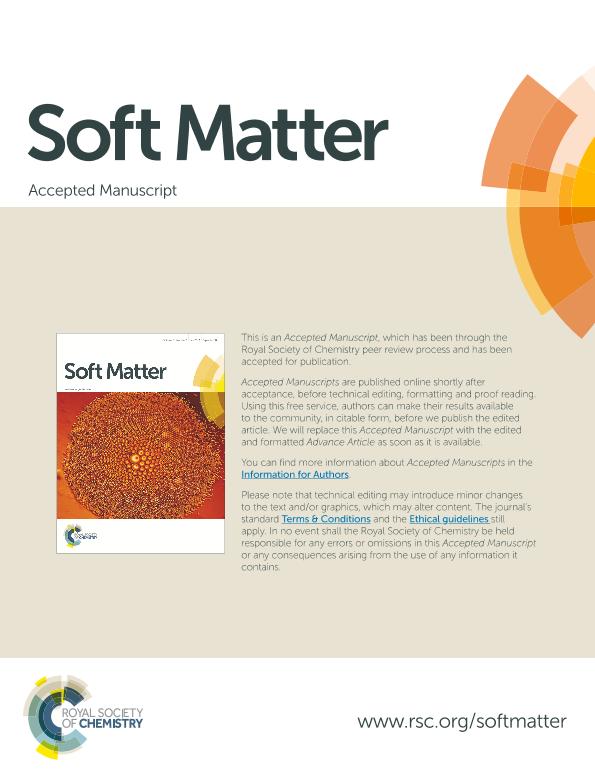Mostrar el registro sencillo del ítem
dc.contributor.author
Narambuena, Claudio Fabian

dc.contributor.author
Longo, Gabriel Sebastian

dc.contributor.author
Szleifer, Igal

dc.date.available
2018-06-18T17:10:47Z
dc.date.issued
2015-07
dc.identifier.citation
Narambuena, Claudio Fabian; Longo, Gabriel Sebastian; Szleifer, Igal; Lysozyme adsorption in pH-responsive hydrogel thin-films: the non-trivial role of acid-base equilibrium; Royal Society of Chemistry; Soft Matter; 11; 33; 7-2015; 6669-6679
dc.identifier.issn
1744-683X
dc.identifier.uri
http://hdl.handle.net/11336/49013
dc.description.abstract
We develop and apply a molecular theory to study the adsorption of lysozyme on weak polyacid hydrogel films. The theory explicitly accounts for the conformation of the network, the structure of the proteins, the size and shape of all the molecular species, their interactions as well as the chemical equilibrium of each titratable unit of both the protein and the polymer network. The driving forces for adsorption are the electrostatic attractions between the negatively charged network and the positively charged protein. The adsorption is a non-monotonic function of the solution pH, with a maximum in the region between pH 8 and 9 depending on the salt concentration of the solution. The non-monotonic adsorption is the result of increasing negative charge of the network with pH, while the positive charge of the protein decreases. At low pH the network is roughly electroneutral, while at sufficiently high pH the protein is negatively charged. Upon adsorption, the acid-base equilibrium of the different amino acids of the protein shifts in a nontrivial fashion that depends critically on the particular kind of residue and solution composition. Thus, the proteins regulate their charge and enhance adsorption under a wide range of conditions. In particular, adsorption is predicted above the protein isoelectric point where both the solution lysozyme and the polymer network are negatively charged. This behavior occurs because the pH in the interior of the gel is significantly lower than that in the bulk solution and it is also regulated by the adsorption of the protein in order to optimize protein-gel interactions. Under high pH conditions we predict that the protein changes its charge from negative in the solution to positive within the gel. The change occurs within a few nanometers at the interface of the hydrogel film. Our predictions show the non-trivial interplay between acid-base equilibrium, physical interactions and molecular organization under nanoconfined conditions, which leads to non-trivial adsorption behavior that is qualitatively different from what would be predicted from the state of the proteins in the bulk solution.
dc.format
application/pdf
dc.language.iso
eng
dc.publisher
Royal Society of Chemistry

dc.rights
info:eu-repo/semantics/openAccess
dc.rights.uri
https://creativecommons.org/licenses/by-nc-sa/2.5/ar/
dc.subject
Protein Adsorption
dc.subject
Stimuli-Responsive Hydrogels
dc.subject
Molecular Simulations
dc.subject
Chromatography
dc.subject.classification
Otras Ciencias Químicas

dc.subject.classification
Ciencias Químicas

dc.subject.classification
CIENCIAS NATURALES Y EXACTAS

dc.title
Lysozyme adsorption in pH-responsive hydrogel thin-films: the non-trivial role of acid-base equilibrium
dc.type
info:eu-repo/semantics/article
dc.type
info:ar-repo/semantics/artículo
dc.type
info:eu-repo/semantics/publishedVersion
dc.date.updated
2018-06-14T19:06:50Z
dc.journal.volume
11
dc.journal.number
33
dc.journal.pagination
6669-6679
dc.journal.pais
Reino Unido

dc.journal.ciudad
Cambridge
dc.description.fil
Fil: Narambuena, Claudio Fabian. Consejo Nacional de Investigaciones Científicas y Técnicas. Centro Científico Tecnológico Conicet - La Plata. Instituto de Investigaciones Fisicoquímicas Teóricas y Aplicadas. Universidad Nacional de La Plata. Facultad de Ciencias Exactas. Instituto de Investigaciones Fisicoquímicas Teóricas y Aplicadas; Argentina. Northwestern University; Estados Unidos
dc.description.fil
Fil: Longo, Gabriel Sebastian. Consejo Nacional de Investigaciones Científicas y Técnicas. Centro Científico Tecnológico Conicet - La Plata. Instituto de Investigaciones Fisicoquímicas Teóricas y Aplicadas. Universidad Nacional de La Plata. Facultad de Ciencias Exactas. Instituto de Investigaciones Fisicoquímicas Teóricas y Aplicadas; Argentina
dc.description.fil
Fil: Szleifer, Igal. Northwestern University; Estados Unidos
dc.journal.title
Soft Matter

dc.relation.alternativeid
info:eu-repo/semantics/altIdentifier/doi/http://dx.doi.org/10.1039/C5SM00980D
dc.relation.alternativeid
info:eu-repo/semantics/altIdentifier/url/http://pubs.rsc.org/en/Content/ArticleLanding/2015/SM/C5SM00980D#!divAbstract
Archivos asociados
